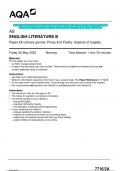2023 AQA AS ENGLISH LITERATURE B 7716/2A Paper 2A Literary genres: Prose and Poetry:
Aspects of tragedy Question Paper & Mark scheme (Merged) June 2023 [VERIFIED]
AS
ENGLISH LITERATURE B
Paper 2A Literary genres: Prose and Poetry: Aspects of tragedy
Friday 26 May 2023 Morning Time allowed: 1 hour 30 minutes
Materials
For this paper you must have:
• an AQA 12-page answer book
• a copy of the set text(s) you have studied. These texts must not be annotated and must not
contain additional notes or materials.
Instructions
• Use black ink or black ball-point pen.
• Write the information required on the front of your answer book. The Paper Reference is 7716/2A.
• Do all rough work in your answer book. Cross through any work you do not want to be marked.
• You must answer one question from Section A and one question from Section B.
Information
• The maximum mark for this paper is 50.
• The marks for questions are shown in brackets.
• You will be marked on your ability to:
– use good English
– organise information clearly
– use specialist vocabulary where appropriate.
• In your response you need to:
– analyse carefully the writers’ methods
– explore the contexts of the texts you are writing about
– explore the connections across the texts you have studied
– explore different interpretations of your texts.
IB/G/Jun23/E4 7716/2A
, 2
Section A
Answer one question from this section.
Either
0 1 John Keats selection
Explore the significance of settings to the tragic experiences in Keats’ poetry.
You must refer to The Eve of St Agnes and one other poem.
In your answer you need to analyse closely Keats’ authorial methods and include
comments on the extract below.
[25 marks]
From The Eve of St Agnes
l
St Agnes’ Eve – Ah, bitter chill it was!
The owl, for all his feathers, was a-cold;
The hare limped trembling through the frozen grass,
And silent was the flock in woolly fold:
Numb were the Beadsman’s fingers, while he told
His rosary, and while his frosted breath,
Like pious incense from a censer old,
Seemed taking flight for heaven, without a death,
Past the sweet Virgin’s picture, while his prayer he saith.
ll
His prayer he saith, this patient, holy man;
Then takes his lamp, and riseth from his knees,
And back returneth, meagre, barefoot, wan,
Along the chapel aisle by slow degrees:
The sculptured dead, on each side, seem to freeze,
Emprisoned in black, purgatorial rails;
Knights, ladies, praying in dumb orat’ries,
He passeth by; and his weak spirit fails
To think how they may ache in icy hoods and mails.
lll
Northward he turneth through a little door,
And scarce three steps, ere Music’s golden tongue
Flattered to tears this agèd man and poor;
But no – already had his deathbell rung:
The joys of all his life were said and sung:
His was harsh penance on St Agnes’ Eve.
Another way he went, and soon among
Rough ashes sat he for his soul’s reprieve,
And all night kept awake, for sinners’ sake to grieve.
IB/G/Jun23/7716/2A
, 3
or
0 2 Thomas Hardy selection
Explore the significance of settings to the tragic experiences in Hardy’s poetry.
You must refer to Under the Waterfall and at least one other poem.
In your answer you need to analyse closely Hardy’s authorial methods and include
comments on the extract below.
[25 marks]
From Under the Waterfall
‘And why gives this the only prime
Idea to you of a real love-rhyme?
And why does plunging your arm in a bowl
Full of spring water, bring throbs to your soul?’
‘Well, under the fall, in a crease of the stone,
Though where precisely none ever has known,
Jammed darkly, nothing to show how prized,
And by now with its smoothness opalized,
Is a drinking-glass:
For, down that pass
My lover and I
Walked under a sky
Of blue with a leaf-wove awning of green,
In the burn of August, to paint the scene,
And we placed our basket of fruit and wine
By the runlet’s rim, where we sat to dine;
And when we had drunk from the glass together,
Arched by the oak-copse from the weather,
I held the vessel to rinse in the fall,
Where it slipped, and sank, and was past recall,
Though we stooped and plumbed the little abyss
With long bared arms. There the glass still is.
Turn over for the next question
Turn over ►
IB/G/Jun23/7716/2A
, 4
or
0 3 Poetry Anthology: Tragedy
Explore the significance of settings to the tragic experiences in Poetry Anthology:
Tragedy.
You must refer to Death in Leamington and at least one other poem.
In your answer you need to analyse closely the poets’ authorial methods and include
comments on the extract below.
[25 marks]
From Death in Leamington
She died in the upstairs bedroom
By the light of the ev’ning star
That shone through the plate glass window
From over Leamington Spa.
Beside her the lonely crochet
Lay patiently and unstirred,
But the fingers that would have work’d it
Were dead as the spoken word.
And Nurse came in with the tea-things
Breast high ’mid the stands and chairs –
But Nurse was alone with her own little soul,
And the things were alone with theirs.
She bolted the big round window,
She let the blinds unroll,
She set a match to the mantle,
She covered the fire with coal.
And “Tea!” she said in a tiny voice
“Wake up! It’s nearly five.”
Oh! Chintzy, chintzy cheeriness,
Half dead and half alive!
IB/G/Jun23/7716/2A




